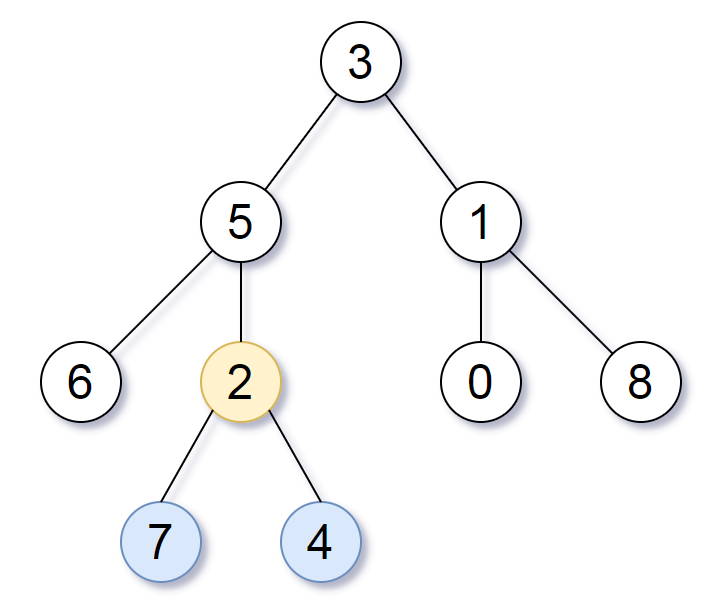原文链接: https://leetcode-cn.com/problems/lowest-common-ancestor-of-deepest-leaves
英文原文
Given the root of a binary tree, return the lowest common ancestor of its deepest leaves.
Recall that:
- The node of a binary tree is a leaf if and only if it has no children
- The depth of the root of the tree is
0. if the depth of a node isd, the depth of each of its children isd + 1. - The lowest common ancestor of a set
Sof nodes, is the nodeAwith the largest depth such that every node inSis in the subtree with rootA.
Example 1:

Input: root = [3,5,1,6,2,0,8,null,null,7,4] Output: [2,7,4] Explanation: We return the node with value 2, colored in yellow in the diagram. The nodes coloured in blue are the deepest leaf-nodes of the tree. Note that nodes 6, 0, and 8 are also leaf nodes, but the depth of them is 2, but the depth of nodes 7 and 4 is 3.
Example 2:
Input: root = [1] Output: [1] Explanation: The root is the deepest node in the tree, and it's the lca of itself.
Example 3:
Input: root = [0,1,3,null,2] Output: [2] Explanation: The deepest leaf node in the tree is 2, the lca of one node is itself.
Constraints:
- The number of nodes in the tree will be in the range
[1, 1000]. 0 <= Node.val <= 1000- The values of the nodes in the tree are unique.
Note: This question is the same as 865: https://leetcode.com/problems/smallest-subtree-with-all-the-deepest-nodes/
中文题目
给你一个有根节点的二叉树,找到它最深的叶节点的最近公共祖先。
回想一下:
- 叶节点 是二叉树中没有子节点的节点
- 树的根节点的 深度 为
0,如果某一节点的深度为d,那它的子节点的深度就是d+1 - 如果我们假定
A是一组节点S的 最近公共祖先,S中的每个节点都在以A为根节点的子树中,且A的深度达到此条件下可能的最大值。
注意:本题与力扣 865 重复:https://leetcode-cn.com/problems/smallest-subtree-with-all-the-deepest-nodes/
示例 1:

输入:root = [3,5,1,6,2,0,8,null,null,7,4] 输出:[2,7,4] 解释: 我们返回值为 2 的节点,在图中用黄色标记。 在图中用蓝色标记的是树的最深的节点。 注意,节点 6、0 和 8 也是叶节点,但是它们的深度是 2 ,而节点 7 和 4 的深度是 3 。
示例 2:
输入:root = [1] 输出:[1] 解释:根节点是树中最深的节点,它是它本身的最近公共祖先。
示例 3:
输入:root = [0,1,3,null,2] 输出:[2] 解释:树中最深的叶节点是 2 ,最近公共祖先是它自己。
提示:
- 给你的树中将有 1 到 1000 个节点。
- 树中每个节点的值都在 1 到 1000 之间。
- 每个节点的值都是独一无二的。
通过代码
高赞题解
解题思路
第一种容想到的常规解法
类似于前序遍历,从根节点开始,分别求左右子树的高度left,和right。
- 情况1:left=right 那么两边子树的最深高度相同,返回本节点
- 情况2:left<right 说明最深节点在右子树,直接返回右子树的递归结果
- 情况2:left>right 说明最深节点在左子树,直接返回右子树的递归结果
其中求子树的高度需要定义一个方法,就是104. 二叉树的最大深度,很简单。
代码
class Solution {
public TreeNode lcaDeepestLeaves(TreeNode root) {
if(root==null) return null;
int left=dfs(root.left);
int right=dfs(root.right);
if(left==right) return root;
else if(left<right) return lcaDeepestLeaves(root.right);
return lcaDeepestLeaves(root.left);
}
int dfs(TreeNode node){
if(node==null) return 0;
return 1+Math.max(dfs(node.right),dfs(node.left));
}
}第二种方法,
第二种方法其实就是求后序遍历,代码结构有点类似于求最大深度,只不过要想办法保存最近的节点,和返回深度
首先定义一个点来保存最近公共祖先,定义一个pre来保存上一次得到的最近公共祖先的深度。
在递归过程中,带一个参数level表示当前遍历到的节点的深度
如果node为空,返回当前深度。
如果不为空,则当前节点的逻辑为:
分别求左子树和右子树的最大深度,left和right
- 1.left=right 如果相同,并且当前深度大于上一次的最大深度,说明当前节点为最新的最近公共祖先,上一次的没有当前这个深,将当前节点保存在结果中,并将深度pre更新。
- 2.left不等于right 则直接返左右子树的最大深度

class Solution {
TreeNode res = null;
int pre=0;
public TreeNode lcaDeepestLeaves(TreeNode root) {
dfs(root,1);
return res;
}
int dfs(TreeNode node,int depth){
if(node==null) return depth;
int left=dfs(node.left,depth+1);
int right =dfs(node.right,depth+1);
if(left==right&&left>=pre){
res=node;
pre=left;
}
return Math.max(left,right);
}
}统计信息
| 通过次数 | 提交次数 | AC比率 |
|---|---|---|
| 8539 | 12126 | 70.4% |
提交历史
| 提交时间 | 提交结果 | 执行时间 | 内存消耗 | 语言 |
|---|




